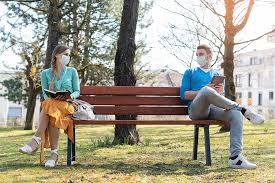TIME TO GET SERIOUS ABOUT SOCIAL DISTANCING?

As restrictions on movement are greatly eased from 1 June, everyone will be at increased risk of contracting COVID-19. We have been warned that numbers are going to rise dramatically from now. It’s a good time to remind ourselves why social distancing at this time is even more important than before Level 3.
Many residents have taken it upon themselves to gather with friends in their estate or complex, or used their entry cards to sneak in family members, even while social gathering is still prohibited under the regulations. Why do we do that? Because human beings are naturally social and need each other’s company; we miss our families and long to see and hold them. The question we need to ask ourselves is: Is it a smart thing to do during this pandemic?
‘Small’ social risks
We may think that ‘small’ social risks, like visiting our grandmother when we’ve been isolated (except for shopping for essentials like groceries) for 14 days and have no symptoms, surely must be OK. Not necessarily. We may still have been exposed and have acquired the virus any time during those 14 days. Not to be alarmist, but how would we feel if we were the only person to have come into close contact with our grandmother, and she subsequently fell ill and died from COVID-19?
Young people also getting ill
And while the elderly are most at risk, no-one is ‘safe’ from this virus, as young people are increasingly shown to be contracting the disease. According to Fortune Magazine, young people—from twenty-somethings to those in their early forties—are falling seriously ill. Many require intensive care, according to reports from Italy and France. The risk is particularly dire for those with ailments that haven’t yet been diagnosed.
In Italy, one of the hardest hit European countries, which reported 231 000 cases as of May 26, 28.8% of those who contracted the virus were between 19-50 years old, according to the website Statistica.
As at 15 June, this age group in South Africa accounted for slightly less at 20.6%, but the message remains clear: No-one should assume they are safe from infection.
Points to ponder:
- While there are hopeful treatments being tested, there is currently no confirmed effective treatment or vaccine for Covid-19
- It is widely predicted that South African hospitals, like many others in the world including in high-income countries, will not be able to cope with the expected influx of patients over coming months, unless a cure is found soon.
- In a grim reminder of the scale of the anticipated surge in deaths, is health minister Zweli Mkhize’s directive last month that South Africa’s municipalities should find sites where mass graves can be located for Covid-19 victims. None of us would want our friends and family to be among those.
There’s no guarantee that we will not catch the virus, or pass it on to someone else. Even our best efforts to avoid it may not be good enough. While we wait for a successful treatment or vaccine, the only thing within our control is to follow recommendations regarding hand hygiene, face masks and, in so far as it is in our power, to avoid social gatherings. No-one wants to look back when it is too late and say, “If only I had isolated myself more”.
This article has been updated to include the latest statistics from the Department of Health


Sorry, the comment form is closed at this time.